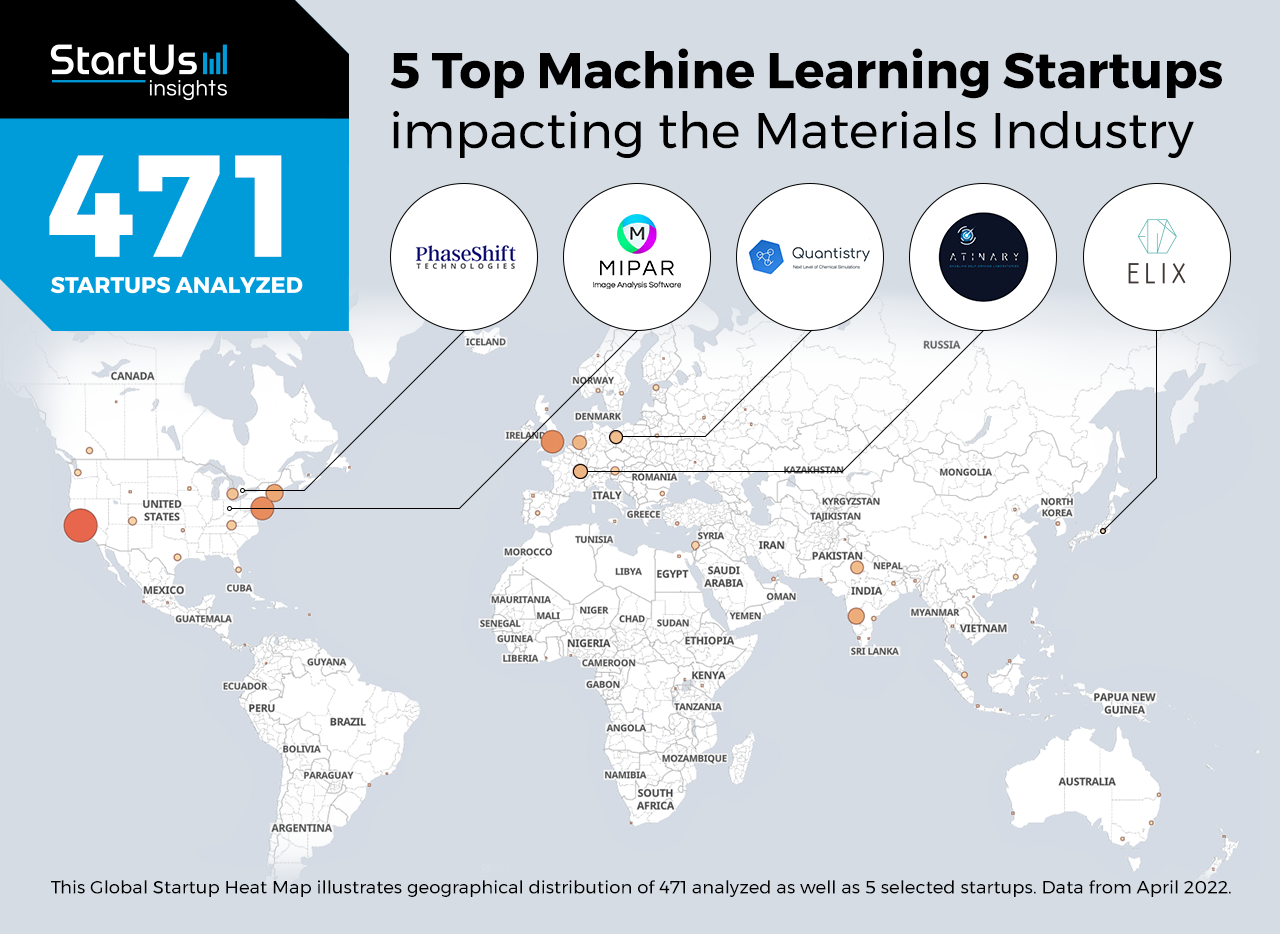Staying ahead of the technology curve means strengthening your competitive advantage. That is why we give you data-driven innovation insights into the materials industry. This time, you get to discover five hand-picked machine learning startups impacting the materials industry.
Out of 471, the Global Startup Heat Map highlights 5 Top Machine Learning Startups impacting the Materials Industry
The insights of this data-driven analysis are derived from the Big Data & Artificial Intelligence (AI)-powered StartUs Insights Discovery Platform, covering 2 093 000+ startups & scaleups globally. The platform gives you an exhaustive overview of emerging technologies & relevant startups within a specific field in just a few clicks.
The Global Startup Heat Map below reveals the distribution of the 471 exemplary startups & scaleups we analyzed for this research. Further, it highlights five machine learning startups that we hand-picked based on criteria such as founding year, location, funding raised, and more. You get to explore the solutions of these five startups & scaleups in this report. For insights on the other 466 machine learning solutions impacting the materials industry, get in touch with us.
Elix provides Material Informatics
Founding Year: 2016
Location: Tokyo, Japan
Partner with Elix for Novel Material Development
Japanese startup Elix offers a material informatics platform that improves the efficiency of novel material development processes. The startup’s platform, Elix Discovery, allows users to search for materials with superior properties and other target requirements. Using machine learning (ML) algorithms, it performs activity prediction, property prediction, and retrosynthesis analysis. This enables efficient molecular design for pharmaceutical companies, chemical manufacturers, and researchers.
PhaseShift offers ML-driven Material Engineering
Founding Year: 2019
Location: Toronto, Canada
Funding: USD 575 000
Innovate with PhaseShift to Alloy Property Prediction
Canadian startup PhaseShift utilizes ML-aided quantum chemistry calculations to discover, design, optimize, and process high-performance alloys. The startup’s ML-driven material engineering platform generates models for property prediction and optimization to guide the experimental design of alloys. These alloys include metallic glasses, high-entropy alloys, and complex concentrated alloys. Phaseshift’s technology enables the development of materials for various manufacturing methods like additive manufacturing and metal injection molding. Moreover, it reduces material wastage as well as advances commercial material research.
Atinary accelerates Material Development
Founding Year: 2019
Location: Lausanne, Switzerland
Collaborate with Atinary for Material Formulation Optimization
Atinary is a Swiss startup that advances material discoveries and innovations. The startup’s software, Atinary SDLabs Enterprise, uses AI to augment and improve decision-making. This reduces the number of experiments to optimize the properties and performance of materials. Further, by leveraging high computing power, it speeds up the optimization of multi-dimensional and multi-objective material development processes.
MIPAR advances Micrograph Analysis
Founding Year: 2017
Location: Worthington, US
Use MIPAR’s solution for Material Characterization
US-based startup MIPAR builds image analysis software and algorithms to extract measurements from complex images. The startup’s solution offers an intuitive user experience and features drag-and-drop custom algorithm development and a deep learning toolbox, which facilitates material analysis. This includes fiber thickness analysis, grain size measurements, generic particle analysis, phase composition testing, and defect assessments. MIPAR’s software thus eliminates the margin for error associated with classic micrograph analysis usually used for material structure evaluation.
Quantistry offers Quantum Chemistry Simulations
Founding Year: 2019
Location: Berlin, Germany
Work with Quantistry for Computational Chemistry
German startup Quantistry provides a cloud-based simulation platform for innovative material research and development (R&D). The platform combines quantum simulations, molecular dynamics, and ML to develop better chemical and pharmaceutical products in less time. It also uses tools such as prediction models, density functional theory (DFT), Post-Hartree-Fock, and classical force field models to solve R&D challenges. Quantistry’s decentralized and scalable solution reduces the cost of research and development by optimizing laboratory equipment, staff, the purchase of reactants, and chemical waste disposal.
Discover more Materials Startups
Materials startups such as the examples highlighted in this report focus on data-driven material engineering, materials property simulations and predictions as well as computational chemistry and quantum computing. While all of these technologies play a major role in advancing the materials industry, they only represent the tip of the iceberg. To explore materials technologies in more detail, simply let us look into your areas of interest. For a more general overview, download our free Materials Innovation Report to save your time and improve strategic decision-making.









